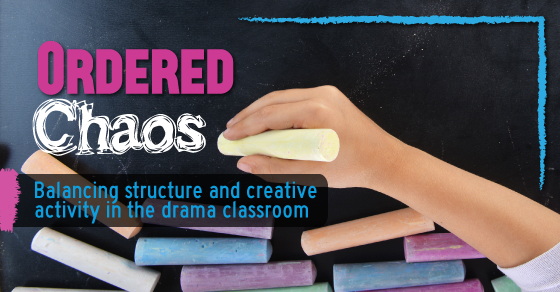How to Keep Drama Class Chaos Under Control
Drama classes are chaotic by design.
A good drama class should be an active and energetic environment where students are exploring and creating with their peers. That means groups of students spending a lot of time out of their seats and speaking loudly. In other words… chaos! With that in mind, how are you supposed to control a drama class?
Here are three classroom management rules you need to follow to keep the chaos to a minimum:
1. Have clear rules and expectations.
Even the most chaotic classroom should have rules and expectations. But where do these rules come from? They come from YOU! You are in charge and you need to be able to envision and articulate how you expect YOUR classroom to function. You decide the level of activity and noise you are willing to tolerate, and then create the specific rules, guidelines, and expectations that students need to follow to achieve your vision. Once you have defined your rules and expectations, share them with your students at the beginning of each new semester — both verbally and in writing. That way students will know what is expected in your class from day one.
2. Have appropriate consequences.
Rules without consequence are tigers without teeth. In order for students to take your rules and expectations seriously, there need to be consequences in place for when rules are broken and expectations are not met. These consequences do not need to be harsh to be effective; sometimes a quick, private word with a wayward student is enough to get them back on track. What is most important is that the consequences are appropriate to the offense. Minor offences can be handled with smaller consequences, whereas completely unacceptable behaviour requires more severe consequences. However, keep in mind that your consequences cannot supersede school or district rules, and more importantly, must respect local laws. Again, make sure your students know both the rules AND consequences for their behaviour in your classes. Repeat this information early and often!
3. Be consistent.
The most important rule of classroom control is consistency. That means that you need to call out infractions every time you see them and apply the appropriate consequences to the student, or students, in error. You cannot turn a blind eye or practise favoritism, or your students will quickly realize that your rules aren’t fair, and therefore they do not need to follow them. Consistency is the foundation of a well-managed classroom and allows students to fully participate knowing that rules and boundaries exist, and apply equally to everyone.
Additional Reading:
Round-up: All About Classroom Management
Ordered Chaos: Balancing structure and creative activity in the drama classroom
Establishing Boundaries With Your Students



